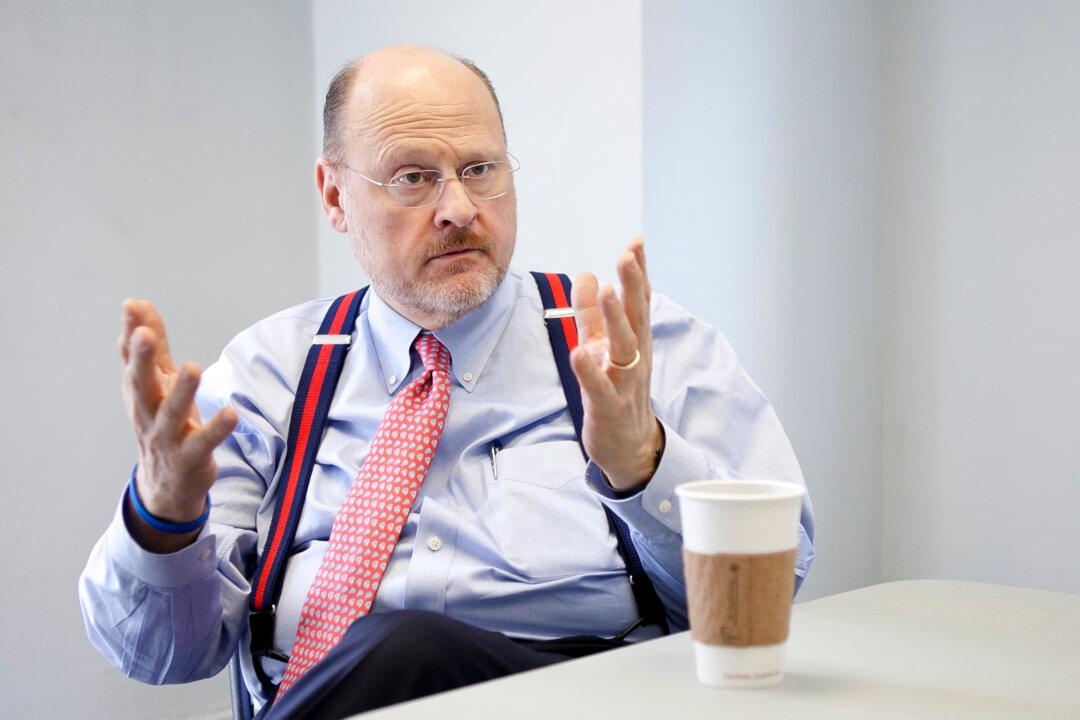NEW YORK—Joseph Lhota had been directing traffic near the World Trade Center to make room for ambulances when the second plane hit on Sept. 11, 2001. People were jumping from the tower, landing close to him; shattered glass poured onto the streets. Lhota recalled jumping into a white postal police car behind the Church Street station, moments before a plank of metal fell onto the car and collapsed the roof.
“That was just the beginning of the day,” Lhota recalled. “I didn’t get to bed until four o’clock the next morning.”
As deputy mayor at the time, Lhota spent the next 19 hours making sure the city would carry on as close to normal as possible the next day. He made sure garbage trucks still ran, and delivery trucks still came.
“We were in a sense of fear that day, but I had to make sure that New York didn’t have any additional fears, such as not getting food,” he said.
The Giuliani administration had created the office of emergency management. They planned and prepped for all kinds of natural disasters and emergencies, including a bio chemical attack.
“We had all kinds of planning exercises, we even planned for Y2K, which, by the way may have been the biggest hoax perpetrated on mankind, by consulting firms,” Lhota said.
Although the Y2K turned out to have a minimal effect on the world, it did help New York become more prepared for disasters.
As a result of the Y2K scare, the mayor’s office made preparations for power outage, water loss, and elevator shut downs.
“And all of that practice kicked in on 9/11,” Lhota said.
But the destruction of Hurricane Sandy required a much different type of preparation.
Lhota served as chairman of the Metropolitan Transit Authority from October 2011 to December 2012.
When Hurricane Sandy hit, he recalled arriving in Lower Manhattan on Oct. 22 at 7 p.m. to see how far the water had flooded. It was a humbling moment, as he watched a torrent of water rush into the South Ferry station.
He walked over to the Brooklyn Battery Tunnel, where two weeks prior, he had attended the ceremony to rename it the Hugh Carey Tunnel.
He watched the white water rapidly surge into the tunnel. “I will never forget that noise. ...The roar of a river in New York City,” he said. “It reminded me of the Indian River out west.”
He looked over at Gov. Andrew Cuomo by the tunnel, who made an attempt to lighten the situation. “I remember him asking ‘Hey Joe is this normal?’”
“We had no idea when this water was going to stop, where it was going,” he said.
Lhota was awestruck, but he had no fear.
“I really do fear nothing, I just want to do whatever is the right thing to do and I will live with the consequences,” Lhota said.
He wears a dark blue rubber bracelet that says “Fear Nothing.” It was given to him by friends when he was undergoing chemotherapy for Hodgkin lymphoma, a cancer that originates in white blood cells.
He was diagnosed with cancer seven years ago. “When a doctor tells you, you have cancer, all kinds of alarms go off in your head and you change the way you are,” he said. “I now look at every day as if it were the last day of my life.”
His cancer is now in remission. “I’m like a car, I have to go in every six months for a check in but I’m in remission,” he joked.
After coordinating New York City’s response to a terrorist attack, defeating cancer, and directing the recovery of the city’s most vital line of transportation after Hurricane Sandy, Lhota has acquired quite a list of experiences under his belt.
But sometimes it is intuition that counts, he said.
“You practice, drill, and then when it comes to game days there’s no practice or books and you just play,” he said. “That’s what we do in emergencies, we don’t have time to sit at a table and talk, you know where your teammates are, you really need to kick into gear.”
Humble Beginnings
Although Lhota received a master’s degree in business administration from Harvard Business School in 1980, and led a 14-year career in investment banking, his achievements didn’t spur from family connections.
Both his parents were teenagers when Lhota was born. His father was a sheet metal worker, who later became an NYPD lieutenant.
Finances were tight when Lhota was growing up, and his mother worked multiple jobs to help pay for his Catholic school education.
“One of my oldest memories is my father telling me that I’m going to be the first person in our family to go to college,” he said. “It was as important to him as anything else could be. For him it was a real goal for the entire family.”
Although he had a meager childhood, he remembers it as a happy one with many hours spent at Pelham Bay Park.
He recalled walking by the Pelham Bay Park Monday as he was heading toward the Bronx County Republican headquarters.
“It’s funny, the Bronx county Republican headquarters is in the neighborhood where I grew up,” he said.
Although Lhota has a thorough economic background, expanding park space is on his list of priorities as mayor.
“Pelham Bay Park, its now the largest park in City of New York. It’s got its own beach,” he said. “I think I know every single inch of that park. Growing up in the Bronx was a phenomenal experience.”
“That’s the experience I want for all New Yorkers,” he said.




